The AMD Ryzen 5 1600X vs Core i5 Review: Twelve Threads vs Four at $250
by Ian Cutress on April 11, 2017 9:00 AM ESTBenchmarking Performance: CPU Encoding Tests
One of the interesting elements on modern processors is encoding performance. This includes encryption/decryption, as well as video transcoding from one video format to another. In the encrypt/decrypt scenario, this remains pertinent to on-the-fly encryption of sensitive data - a process by which more modern devices are leaning to for software security. Video transcoding as a tool to adjust the quality, file size and resolution of a video file has boomed in recent years, such as providing the optimum video for devices before consumption, or for game streamers who are wanting to upload the output from their video camera in real-time. As we move into live 3D video, this task will only get more strenuous, and it turns out that the performance of certain algorithms is a function of the input/output of the content.
7-Zip
One of the freeware compression tools that offers good scaling performance between processors is 7-Zip. It runs under an open-source licence, is fast, and easy to use tool for power users. We run the benchmark mode via the command line for four loops and take the output score.
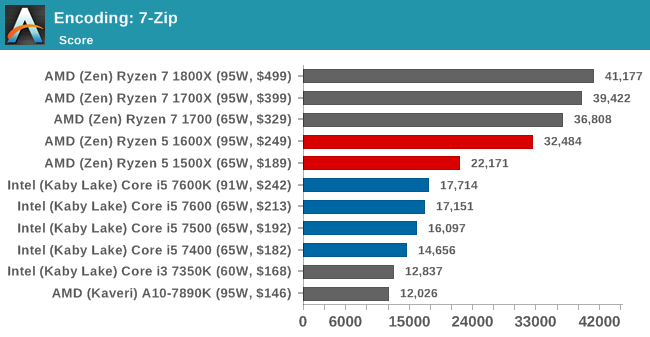
WinRAR 5.40
For the 2017 test suite, we move to the latest version of WinRAR in our compression test. WinRAR in some quarters is more user friendly that 7-Zip, hence its inclusion. Rather than use a benchmark mode as we did with 7-Zip, here we take a set of files representative of a generic stack (33 video files in 1.37 GB, 2834 smaller website files in 370 folders in 150 MB) of compressible and incompressible formats. The results shown are the time taken to encode the file. Due to DRAM caching, we run the test 10 times and take the average of the last five runs when the benchmark is in a steady state.
AES Encoding
Algorithms using AES coding have spread far and wide as a ubiquitous tool for encryption. Again, this is another CPU limited test, and modern CPUs have special AES pathways to accelerate their performance. We often see scaling in both frequency and cores with this benchmark. We use the latest version of TrueCrypt and run its benchmark mode over 1GB of in-DRAM data. Results shown are the GB/s average of encryption and decryption.
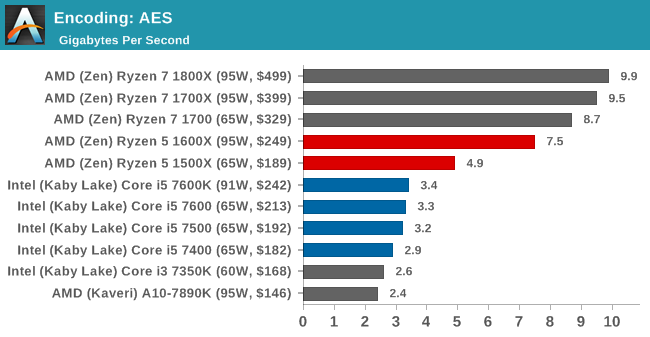
HandBrake H264 and HEVC
As mentioned above, video transcoding (both encode and decode) is a hot topic in performance metrics as more and more content is being created. First consideration is the standard in which the video is encoded, which can be lossless or lossy, trade performance for file-size, trade quality for file-size, or all of the above can increase encoding rates to help accelerate decoding rates. Alongside Google's favorite codec, VP9, there are two others that are taking hold: H264, the older codec, is practically everywhere and is designed to be optimized for 1080p video, and HEVC (or H265) that is aimed to provide the same quality as H264 but at a lower file-size (or better quality for the same size). HEVC is important as 4K is streamed over the air, meaning less bits need to be transferred for the same quality content.
Handbrake is a favored tool for transcoding, and so our test regime takes care of three areas.
Low Quality/Resolution H264: He we transcode a 640x266 H264 rip of a 2 hour film, and change the encoding from Main profile to High profile, using the very-fast preset.
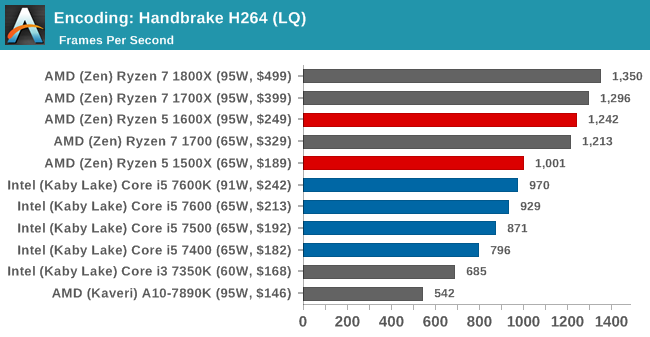
High Quality/Resolution H264: A similar test, but this time we take a ten-minute double 4K (3840x4320) file running at 60 Hz and transcode from Main to High, using the very-fast preset.
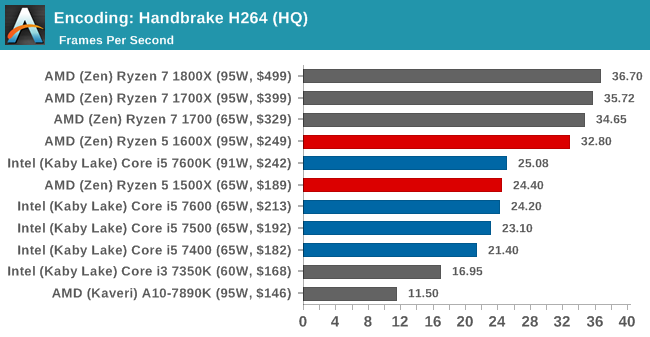
HEVC Test: Using the same video in HQ, we change the resolution and codec of the original video from 4K60 in H264 into 4Kp30 HEVC. This causes a dramatic reduction in filesize (this is a different test to the Ryzen 7 review).
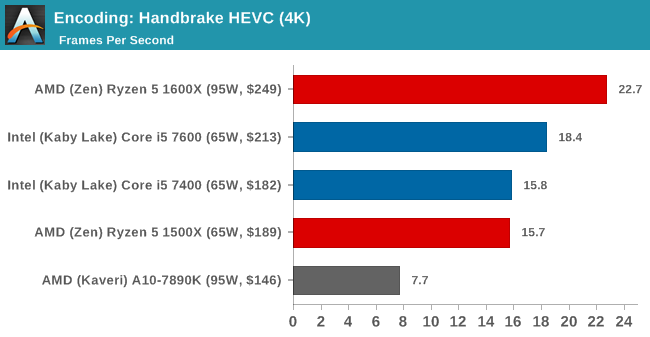


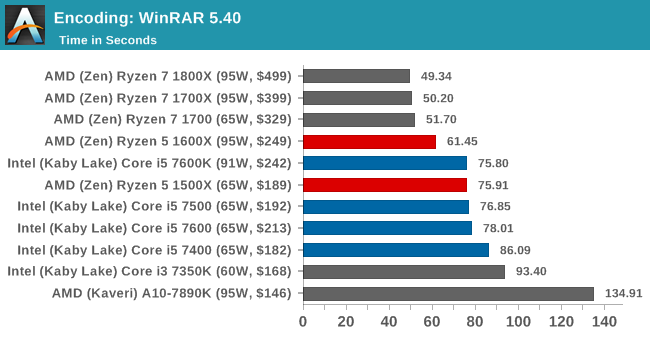








254 Comments
View All Comments
Bp_968 - Sunday, April 16, 2017 - link
This is the point I try to make all the time to console players saying PCs cost too much, require too much upgrading. My i7 970 or 980 (I forget!) Is still playing modern games wonderfully @2560x1440 with a gtx 970. We reciently built a pc for my neighbor out of spare parts and he ended up with a core2 quad (q6600 maybe?) With 6gb ram and a gtx460. He quickly upgraded to a gtx 1050 and now it easily stomps his PS4 (and probably the PS4pro).I'm with one of the previous posters about chipset accessories. It won't be CPU speed that causes me to up upgrade, it will be me wanting access to new features (pcie4, usb-c, usb3.1/3.2, NVMe, Intels ddr/ssd hybrid memory interface, etc etc).
I also expect Intel to respond, at least in the ryzen7 market. I really hope it means Intel will finnally start offering 6-8 core CPUs in non-silly price points.
mmegibb - Tuesday, April 11, 2017 - link
The choice of software hardly matters when what you are looking for is a collection of software that exercises the entire CPU subsystem: the cores, caches, memory, etc. As th3ron mentions, what matters is finding the deltas between CPUs.And yes, in spite of your snobbery, probably 50% of people reading this want to size their system for gaming. Gaming is the limiting case for my home builds.
psychobriggsy - Wednesday, April 12, 2017 - link
Indeed gaming is important for many people.What the reviews show is that for a mixed-use system, the gaming aspect is not significantly behind Intel alternatives (obviously a couple of outliers, but that applies in both directions). However for the other uses, Ryzen is a complete win. It's good enough, rather than the pile of fail that Bulldozer core CPUs were. And indications are that games are getting more multithreaded over time, so buying a 4C product is limiting future gaming.
It's clear that Intel will have to enable SMT in their i5 refreshes this year now, as that should let them claw something back in the 'partial multithreaded' use cases (apps that can't scale indefinitely with extra cores but top out at 4-8 threads).
IanHagen - Tuesday, April 11, 2017 - link
I completely agree on that. I'd love to see more compiling benchmarks too. It's coming to the point where people who are buying a CPU for productivity are taking decisions drawn upon conclusions heavily influenced by gaming performance.RafaelHerschel - Wednesday, April 12, 2017 - link
50% of people use a fast CPU for gaming is a very conservative estimate. For regular office work or for media consumption an inexpensive CPU is fast enough. The current Intel Celeron and Pentium CPUs (or the AMD equivalent) offer much better value for most people. Because of marketing i3 and i5 CPUs sell well.And there are more gamers than professionals who use software that benefits from fast CPUs.
ddriver - Wednesday, April 12, 2017 - link
Dunno about that, of all the people I know who have powerful machines, all do professional work, even those who game. Then again, the selection of my acquaintances has to do with their skills, and I do have to admit I have zero interest in interacting with someone who only plays games.I also know that is 99% of the games on the market cannot utilize 66.66% of that chip.
So you end up putting 50% of the review emphasis on tests that can only utilize 1/3 of the chip.
It is like... testing a sports car and putting 50% of the emphasis on its use as a hearse that will never be used at nowhere near its potential.
mmegibb - Wednesday, April 12, 2017 - link
Man, ddriver, you are an elitist jerk. "I have zero interest in interacting with someone who only plays games". Also, "People who use winrar most likely do not make logical considerations, because if they did, they wouldn't be using garbage like winrar".Why are you like that?
vladx - Wednesday, April 12, 2017 - link
Don't mind ddriver, he's just a pathetic troll who tries too hard.Meteor2 - Wednesday, April 12, 2017 - link
I imagine the proportion of PCs containing higher than i5-7400s bought by consumers used for gaming is much higher than 50%.*Not* talking about business buys here, I'm talking about people spending their own money.
Meteor2 - Wednesday, April 12, 2017 - link
D'oh, I just replied to ddriver. What was I thinking.